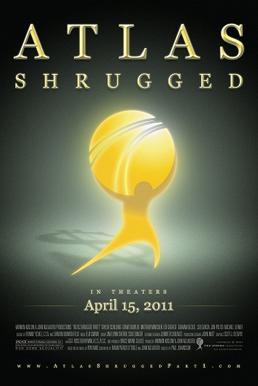The John Galt Jungle
- The classic Ayn Rand novel Atlas Shrugged has finally been brought to the screen after decades of deliberation and hardship in this, the first of three parts: Atlas Shrugged: Part I.
In a not so distant and quite recognizable future, Mid East turmoil has driven the price of gasoline up so high that transportation by car, bus, truck, or plane has become virtually impossible; big government intervention has crippled an individual's ability to be successful; and those who have been able to be successful and keep the private sector alive have been disappearing, leaving nothing but a lingering question: "Who is John Galt?"
Such a future might seem appealing to Al Gore but unaffordable gas and an overreaching government becomes a nightmare for the average American worker. The United States economy lays in shambles; and the only things that are growing faster than the country's hopelessness are government agencies. The sole beneficiary amidst the gasoline lock-out is the railroad industry (since no one can afford to drive or fly), where Dagny Taggart struggles, with entrepreneur Henry Rearden, against the fraudulent government and her own corrupt and incompetent brother to keep their new John Galt rail line on the track to success.
The passion on the part of the filmmakers to translate Ayn Rand's novel onto the silver screen is evident and commendable; unfortunately, the film is not a good translation. While I have never read Rand's book, though it is on the bucket list, and I did enjoy the film's message (or, rather, the fact that a Right-leaning message existed), I was greatly disappointed in the film because of its quality. Atlas Shrugged: Part I is not terrible but, on the other hand, there are not enough positive elements to make it great either.
Some of the actors in Atlas Shrugged give good performances but many do not. Taylor Schilling stars as Dagny Taggart and gives a strong, dimensional portrayal of a compelling character; however, a better actress probably could have done a lot more with the character than Schilling, who emanates Tippi Hedren more than Cate Blanchett. Also, Grant Bowler gives the most impressive performance of the film with a subtle, meticulous turn co-starring as Henry Rearden. Outside of the film's two leads, the finest acting cards are Coen Brothers regulars John Polito and Michael Lerner; basically everyone else in the film are bland (Edi Gathegi, Jsu Garcia) or awful (Matthew Marsden, Graham Beckel).
Atlas Shrugged is directed by Paul Johansson – and if his name is not ringing a bell, it is because he has never directed a full-length feature film before Atlas Shrugged: Part I in 2011. The producers should have held out for a more capable director than Johansson, the former star of "One Tree Hill," but, because the film rights were set to expire, the film went into production quickly with Johansson at the helm. The fact that the film was rushed into production is very clear. While the filmmakers did a great job establishing the possible future that is the featured film world, the plot moves faster than Taggart's train during the first act and most of the characters are given little set up.
Aesthetic-wise, the film could have looked a lot worse but Johansson's inexperience and the film's lower visual quality is apparent. The film features some notably bizarre framing (with several full-body medium long shots cutting off the tops of an actor's head) and its cinematography (conducted by Ross Berryman, whose background is mostly television) is fairly conventional. No doubt due to the low-budget factor, most of the film's special effects are also subpar. The John Galt-line train was created through particularly poor CGI graphics; it almost would have been preferable if the special effects team jury-rigged a model train miniature together out of construction paper and popsicle sticks.
One can criticize the acting, the visuals, or the fast-forward first act but the biggest problem with Atlas Shrugged is how little attention it gives its characters as it preaches to the right-wing choir without really explaining or delving into any of the themes it expresses. Instead of taking the time to open up and explicate its point of view on the impact of big government on individual liberty and collective prosperity through a character-driven story, the film brushes up against the right wing thematic points very quickly around its characters without even explaining how those ideas work on an economic level. Liberal-minded folks certainly will have little reason to love the film thematically coming in and Atlas Shrugged, unfortunately, does not challenge their views with profound philosophical or economic ideas. Similarly, the non-politically-minded film-goer will not appreciate the themes of the story because the film does little to teach them anything. Only those with the conservative/libertarian mindset will attain any level of appreciation for Atlas Shrugged because the film never takes the time to really get into its own themes - and that is just bad storytelling on top of a failure to challenge the Left and enlighten the apolitical.
Atlas Shrugged: Part I was, in short, a heavy disappointment for me. The film was not terrible in my view and I hope to see Parts II and III in the future. However, Part I, at least, does not reach past the quality bar as far as direction, cinematography, and acting goes nor is it a hard-hitting piece of political fiction. And what can a conservative/libertarian, who was hoping for a good movie to come out of the very Liberal Hollywood that speaks to the right-of-center point-of-view for a change, say but "nice try guys, but thumbs down.... anybody up for 'Dirty Harry'?"
CBC Rating: 6/10

No comments:
Post a Comment